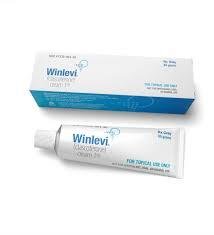Clascoterone
Medically reviewed by Drugs.com. Last updated on Aug 17, 2023.
Pronunciation
(klas KOE ter one)
Index Terms
- Winlevi
Pharmacologic Category
- Androgen Receptor Inhibitor
Pharmacology
Clascoterone is an androgen receptor inhibitor that decreases sebum production and inflammation.
Protein Binding
84% to 89%.
Use: Labeled Indications
Acne vulgaris: Treatment of acne vulgaris in patients ≥12 years of age.
Contraindications
There are no contraindications listed in the manufacturer's labeling.
Dosing: Adult
Acne vulgaris: Topical: Apply thin layer to affected areas of skin twice daily.
Dosing: Pediatric
Acne vulgaris: Children ≥12 years and Adolescents: Topical: Apply thin layer to the affected area twice daily, in the morning and the evening.
Administration
Topical: Clean and dry skin before applying. For topical external use only; not for oral, ophthalmic, or intravaginal use. Avoid contact with eyes, mouth, or other mucous membranes; rinse thoroughly if accidental contact with these areas occurs. Avoid use on cuts, abrasions, and eczematous or sunburned skin.
Related/similar drugs
doxycycline, clindamycin topical, erythromycin topical, tetracycline, Tazorac
Storage
Prior to dispensing, store in refrigerator between 2°C and 8°C (36°F and 46°F); do not freeze. Once dispensed, store at room temperature between 20°C and 25°C (68°F and 77°F). Do not freeze. Discard the unused product 180 days after the date of dispensing or 1 month after first opening, whichever is sooner.
Drug Interactions
There are no known significant interactions.
Adverse Reactions
The following adverse drug reactions and incidences are derived from product labeling unless otherwise specified.
>10%: Dermatologic: Exfoliation of skin (≤11%), xeroderma (≤11%)
1% to 10%:
Cardiovascular: Edema (4%)
Dermatologic: Atrophic striae (3%)
Frequency not defined:
Endocrine & metabolic: Amenorrhea, HPA-axis suppression, hyperkalemia
Genitourinary: Polycystic ovary syndrome
Warnings/Precautions
Concerns related to adverse effects:
• Adrenal suppression: May cause hypercortisolism or suppression of hypothalamic-pituitary-adrenal (HPA) axis, particularly in children and adolescents or in patients receiving high doses for prolonged periods. HPA axis suppression may lead to adrenal crisis.
• Local effects: Local adverse reactions may occur (eg, erythema, redness, pruritus, dryness, scaling) during treatment. Use with concomitant topical products (eg, medicated or abrasive soaps and cleansers, soaps and cosmetics with a strong drying effect, products with high concentrations of alcohol, astringents, spices, or limes) should be limited.
• Systemic effects: Absorption is increased by the use of occlusive dressings, application to large surface areas, or prolonged use.
Special populations:
• Pediatric: Children may absorb proportionally larger amounts after topical application and may be more prone to systemic effects. Prolonged use may affect growth velocity; growth should be routinely monitored in pediatric patients.
Other warnings/precautions:
• Appropriate use: For external use only; not for oral, ophthalmic, or intravaginal use. Avoid contact with eyes, mouth, and other mucous membranes. Not for use on eczematous, abraded, broken, or sunburned skin.
Monitoring Parameters
Skin irritation.
Pregnancy Considerations
Adverse events were observed in some animal reproduction studies following subcutaneous administration. Information related to topical clascoterone exposure in pregnancy is limited. Pregnant patients were excluded from the initial clinical studies and patients were removed from the trial once pregnancy was confirmed (Eichenfield 2020; Hebert 2020).
Patient Education
What is this drug used for?
• It is used to treat pimples (acne).
All drugs may cause side effects. However, many people have no side effects or only have minor side effects. Call your doctor or get medical help if any of these side effects or any other side effects bother you or do not go away:
• Dryness, itching, redness, scaling, or other irritation where this drug was used
WARNING/CAUTION: Even though it may be rare, some people may have very bad and sometimes deadly side effects when taking a drug. Tell your doctor or get medical help right away if you have any of the following signs or symptoms that may be related to a very bad side effect:
• Adrenal gland problems like very bad upset stomach or throwing up, very bad dizziness or passing out, muscle weakness, feeling very tired, mood changes, not hungry, or weight loss
• Signs of an allergic reaction, like rash; hives; itching; red, swollen, blistered, or peeling skin with or without fever; wheezing; tightness in the chest or throat; trouble breathing, swallowing, or talking; unusual hoarseness; or swelling of the mouth.
Note: This is not a comprehensive list of all side effects. Talk to your doctor if you have questions.
Consumer Information Use and Disclaimer: This information should not be used to decide whether or not to take this medicine or any other medicine. Only the healthcare provider has the knowledge and training to decide which medicines are right for a specific patient. This information does not endorse any medicine as safe, effective, or approved for treating any patient or health condition. This is only a limited summary of general information about the medicine's uses from the patient education leaflet and is not intended to be comprehensive. This limited summary does NOT include all information available about the possible uses, directions, warnings, precautions, interactions, adverse effects, or risks that may apply to this medicine. This information is not intended to provide medical advice, diagnosis or treatment and does not replace information you receive from the healthcare provider. For a more detailed summary of information about the risks and benefits of using this medicine, please speak with your healthcare provider and review the entire patient education leaflet.
Frequently asked questions
More about clascoterone topical
- Check interactions
- Compare alternatives
- Reviews (6)
- Side effects
- Dosage information
- During pregnancy
- Drug class: topical acne agents
- Breastfeeding
- En español
Patient resources
Other brands
Professional resources
Other brands
Related treatment guides
Further information
Always consult your healthcare provider to ensure the information displayed on this page applies to your personal circumstances.

